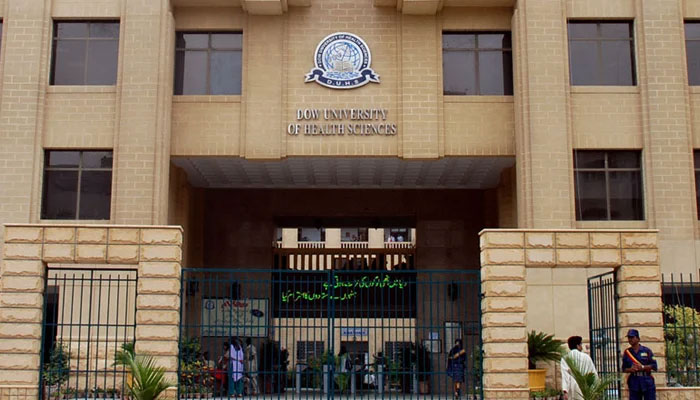Dow University launches locally produced anti-rabies vaccine to address shortage
In a significant stride towards reducing dependency on Indian vaccine imports, the Dow University of Health Sciences (DUHS) has launched its own anti-rabies vaccine (ARV), namely DowRab, locally manufactured with imported raw materials, officials disclosed on Saturday.
“The Dow Institute of Health Sciences (DILS) of the Dow University has successfully produced the first batch of ARV now available in the local market. We have named it DowRab and commenced its commercial production at our Ojha campus,” revealed Prof Saeed Quraishy, the DUHS vice chancellor (VC).
Each year, approximately a million people fall victim to stray dog bites in Pakistan, resulting in an estimated 5,000-6,000 deaths due to rabies. The National Institute of Health (NIH) Islamabad reports that Pakistan requires over 2 million doses of ARV annually, and a majority of these are imported from India.
At the moment, Pakistan is facing a severe shortage of ARV due to conflict over pricing. Importers claim that due to devaluation of the Pakistani rupee against the US dollar, prices of vaccine and other biological products have to be increased but the regulatory authorities are not willing to adjust the prices.
Prof Quraishy maintained that after years of research and regulatory hurdles, they initiated the production of DowRab whose initial batch of 30,000 doses had been handed over to a marketing company for nationwide distribution. "In a few weeks, we anticipate receiving raw materials to produce an additional 170,000 ARV doses, sourced from China," he added.
Pakistan currently grapples with a 70 per cent shortage of ARV. "Currently, we rely on raw materials from China, but we are striving for complete local vaccine production," Prof Quraishy emphasised.
Rabies is predominantly transmitted through dog bites. In 2023 alone, Sindh recorded 200,000 cases of rabies according to data from Jinnah Postgraduate Medical Centre (JPMC).
Prof Quraishy announced the signing of a letter of interest (LOI) with Muller & Phipps Pakistan Private Limited (M&P) for the launch of DowRab in Pakistan. This collaboration aims to combat the deadly rabies disease, with the M&P facilitating marketing and distribution.
The DUHS VC mentioned that the complete course of DowRab would be available for Rs1,500. He added that plans were under way to launch immunoglobulin in the next phase that is administered immediately after a dog bite to prevent rabies transmission.
-
 Jerome Tang Calls Out Team After Embarrassing Home Defeat
Jerome Tang Calls Out Team After Embarrassing Home Defeat -
 Cynthia Erivo Addresses Bizarre Rumour About Her Relationship With Ariana Grande
Cynthia Erivo Addresses Bizarre Rumour About Her Relationship With Ariana Grande -
 Prince Harry, Meghan Markle Spotted Cosying Up At NBA All-Star Game
Prince Harry, Meghan Markle Spotted Cosying Up At NBA All-Star Game -
 Lady Gaga Explains How Fibromyalgia Lets Her 'connect With People Who Have It'
Lady Gaga Explains How Fibromyalgia Lets Her 'connect With People Who Have It' -
 Metro Detroit Weather Forecast: Is The Polar Vortex Coming Back?
Metro Detroit Weather Forecast: Is The Polar Vortex Coming Back? -
 Daniel Radcliffe Reveals Surprising Way Fatherhood Changed Him
Daniel Radcliffe Reveals Surprising Way Fatherhood Changed Him -
 ‘Disgraced’ Andrew At Risk Of Breaking Point As Epstein Scandal Continues
‘Disgraced’ Andrew At Risk Of Breaking Point As Epstein Scandal Continues -
 Alan Cumming Shares Plans With 2026 Bafta Film Awards
Alan Cumming Shares Plans With 2026 Bafta Film Awards -
 OpenClaw Founder Peter Steinberger Hired By OpenAI As AI Agent Race Heats Up
OpenClaw Founder Peter Steinberger Hired By OpenAI As AI Agent Race Heats Up -
 Kate Middleton's Reaction To Harry Stepping Back From Royal Duties Laid Bare
Kate Middleton's Reaction To Harry Stepping Back From Royal Duties Laid Bare -
 Rose Byrne Continues Winning Streak After Golden Globe Awards Victory
Rose Byrne Continues Winning Streak After Golden Globe Awards Victory -
 Ice Hockey Olympics Update: Canada Stays Unbeaten With Dominant Win Over France
Ice Hockey Olympics Update: Canada Stays Unbeaten With Dominant Win Over France -
 Brooklyn Beckham Makes This Promise To Nicola Peltz Amid Family Feud
Brooklyn Beckham Makes This Promise To Nicola Peltz Amid Family Feud -
 Chinese New Year Explained: All You Need To Know About The Year Of The Horse
Chinese New Year Explained: All You Need To Know About The Year Of The Horse -
 Canadian Passport Holders Can Now Travel To China Visa-free: Here's How
Canadian Passport Holders Can Now Travel To China Visa-free: Here's How -
 Maya Hawke Marries Christian Lee Hutson In New York Ceremony
Maya Hawke Marries Christian Lee Hutson In New York Ceremony




